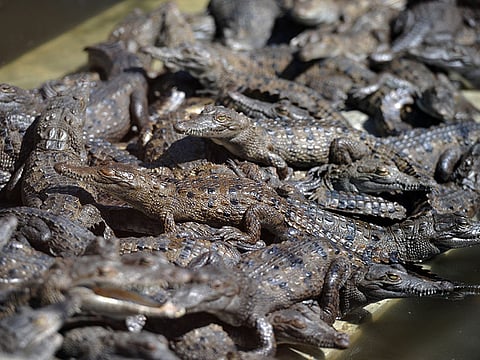How one Philippine billionaire built a crocodile empire
Why own one crocodile when you can have thousands of them?

William Belo, whose Wilcon Depot Inc. dominates the Philippines home-improvement market with 57 stores nationwide, was already on the path to becoming a business success when he decided to try his hand at something different.
He started an egg farm in 1989 as a weekend activity.
Then he needed to figure out how to handle the chickens that were no longer able to lay. So, in the mid-1990s, he thought about feeding them to tigers before settling on crocodiles. He bought about 1,200 of them over three years after learning that a crocodile conservation farm in the province of Palawan was looking to sell some of its stock.
"My plan was just to have a farm with a small number of animals and fresh eggs for personal consumption," Belo said in an interview in Manila. "One thing led to another. We brought in crocodiles to feed the chickens we didn't need."
Today he breeds his crocs by the bask and owns about 23,000 of the semi-aquatic reptiles, for which he has found more lucrative uses. Their skins are supplied to luxury brands such as LVMH, and the meat is found in a variety of food products, including Hungarian sausages and a popular local dish called sisig. The food products are sold under the Dundee brand name, a tribute to the 1986 movie "Crocodile Dundee."
Belo now has two crocodile farms, one for breeding on 10 hectares (24.7 acres), and another that's seven times larger, for culling and managing animal waste. The venture has about 800,000 chickens and 5,000 hogs, and he sells about 2,000 to 3,000 croc skins a year for $200 to $250 apiece.
"It's hard to turn this into a larger scale because food can be very expensive and there are issues of in-breeding which affect the quality of the skin," Belo said. "You aren't allowed to bring in crocodiles from other countries to fix in-breeding and there are few left in the wild."
The price of crocodile skin has dropped because of oversupply prompted by weaker demand for luxury products by Chinese consumers, who he estimates easily account for half of global demand for high-end bags.
"It's hard to grow this into a bigger industry because we don't have breeders and there is a limit to the market now," Belo said.
Still, he's doing just fine. Wilcon is thriving amid a construction boom sweeping the country under President Rodrigo Duterte's "Build, Build, Build" infrastructure push. The value of construction projects rose 22% in the second quarter from a year earlier to 123 billion pesos ($2.4 billion), with residential developments accounting for more than half of that total, according to the Philippine Statistics Authority.
Shares of Manila-based Wilcon have surged 41% this year, outpacing the 2.8% advance for the 262-company Philippine Stock Exchange. That has vaulted Belo into the ranks of the world's billionaires. He and his family control two-thirds of Wilcon, giving him a net worth of about $1 billion, according to the Bloomberg Billionaires Index.
Bloomberg's estimate is "most likely conservative" because it's only based on information that's publicly available, said Jean Alger, Wilcon's head of investor relations, who declined to elaborate on Belo's wealth.
Wilcon targets middle- to high-income homeowners selling everything from plumbing fixtures to tiles and faucets. The home-improvement chain's sales climbed 18% to 11.8 billion pesos in the first half of the year, boosting the company's expansion plans. It expects to have 65 stores next year and 100 by 2025.
After graduating from high school, Belo studied engineering at the University of Santo Tomas in Manila while working evenings at a construction-supply company partially owned by his father. In 1977, he finally opened his own store in a space no bigger than one-bedroom apartment and worked for decades to build a company that is now the leading retailer in the Philippines' home-improvement market.
In an interview with Bloomberg last year, he said he was undaunted by Ikea's plan to open its first store in the country in 2020.
"When you want to build a house, you don't go to Ikea, you go to Wilcon," he said.
While Belo still goes to the office five days a week, he now oversees the business as chairman emeritus while leaving day-to-day operations to his three children.
That's given him "more time to relax," he said, and perhaps devote more time to other pursuits, like raising crocodiles.



